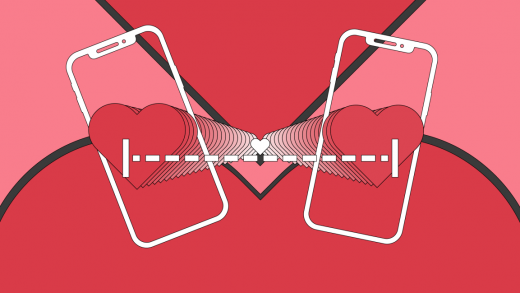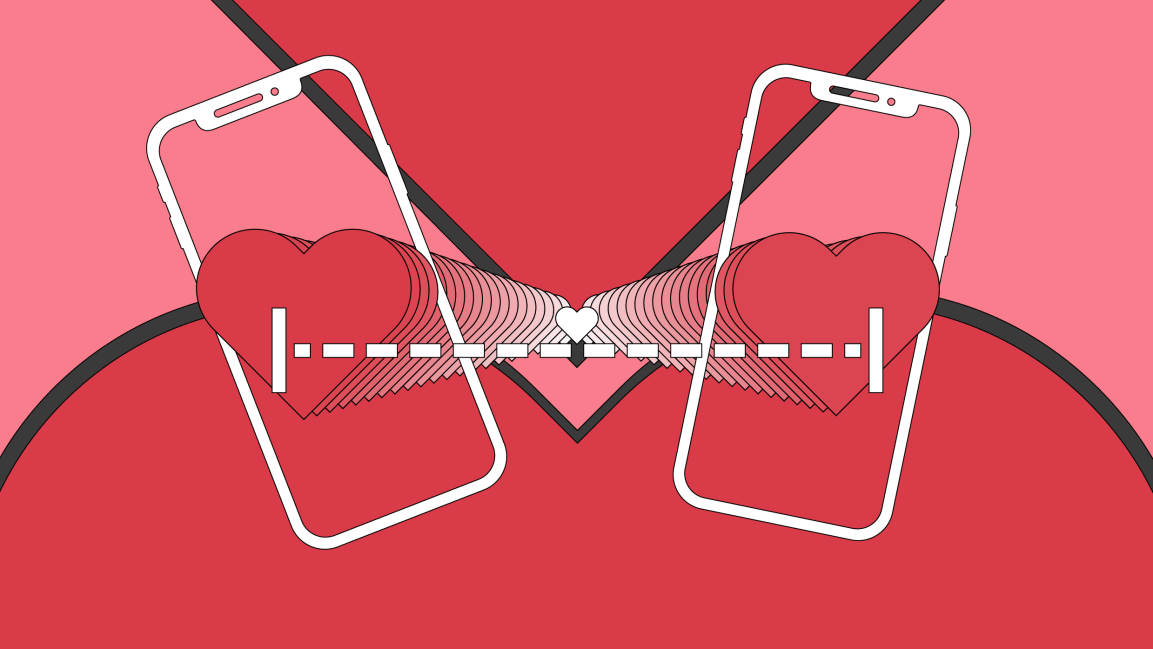How COVID-19 killed hookup culture and saved romance
Wine tasting. Discussing books. Going to concerts. These all sound like fun activities for a date night in a prepandemic world, before we all started self-distancing, wearing masks, and sheltering at home. But it turns out that these playful sparks of early romance are still taking place even now—on computer screens.
As we continue to adjust to self-quarantining, many of us are adjusting our routines in drastic ways and finding activities that fit the circumstances. Dating, by its nature, wouldn’t seem to be one of them. But, with the world enduring a new lonely normal, single people are having to adapt, and there are few other options than video dating. As interest in video dates increases, many of the world’s biggest dating brands have reprioritized their road maps to bring this format to the forefront and have rolled out new in-app video calling features—offering virtual happy hours, hotlines to dating experts to navigate the new situation, and ways to “date” people around the globe. Though it upends romantic traditions that have existed for millennia, some experts think these new features are all positive—helping people make more meaningful connections, even if they come with a few learning curves and hurdles, and will influence the future of dating for good.
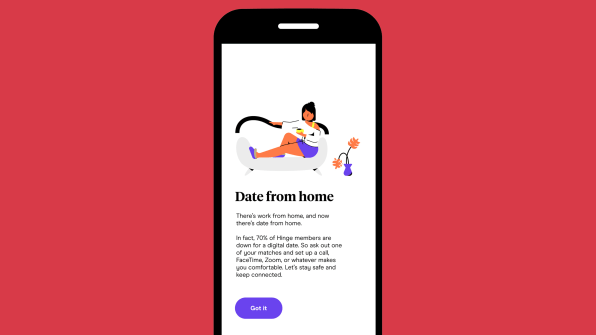
The major dating apps are reporting surges in messaging. On Tinder, daily conversations between users have risen by 20%; OkCupid, also owned by Match Group, has seen a 30% increase in messages sent on the app globally since March 11, around the time that many people began staying home. But, since text-based chats run dry after a while, and apps wanted to ensure users were following social distancing guidelines and not sneaking out for covert dates, they had to get creative and worked to roll out brand-new virtual features as soon as possible. For Match.com, the original Match Group app, those included a hotline to its dating experts so that people could ask questions about dating during this unprecedented time, the answers to which are now packaged in a web resource. And it included setting up virtual happy hours, where 20 to 30 people can join peers of the same age group and city to mingle in a group video, led by a moderator.
But its most important new feature, launched April 15, after 4 weeks of development, is a new in-app video chat service. “We readjusted and reprioritized our road map,” CEO Hessam Hosseini tells Fast Company. Video chat wasn’t a priority before the pandemic, when only 6% of users expressed interest in the feature. Due to the lack of other options, that interest has spiked to 69%.
“What’s the alternative if you don’t have video dating? No dating,” says Catalina Toma, an associate professor at the University of Wisconsin who specializes in the psychology of communication, and whose research has focused on online dating. Video technologies are often frowned upon when it comes to relationships, she says, and they’re not the same as face-to-face meetups, but, she adds, “We’re in a destitute situation now, where we have to use them.”
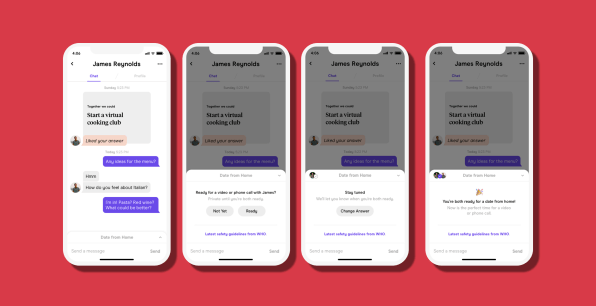
Hinge, another app under the Match Group network, has seen a roughly 30% increase in messaging and has pivoted to video in a feature called “Date from Home.”
“We’re just really trying to encourage and normalize and show people that it’s okay to do video dating,” CEO Justin McLeod tells Fast Company. People have trepidation when it comes to dating virtually; making first impressions behind a screen is hard, and it has its own challenges, such as lighting factors. But, McLeod says, rather than a date, people can consider a video call more of a “vibe check,” to see if people are worth dating in the future. (Match.com’s in-app video feature, incidentally, has been officially dubbed Vibe Check.) Hinge’s pivot to video is not yet an in-app function; the feature allows pairs to signal that they’d be open to video chatting, to eradicate the awkwardness of asking, and from there, they can go to Zoom or FaceTime to chat. That fits snugly into Hinge’s brand identity, which is built around “designed to be deleted“—encouraging people to meet on the app, then get off it as soon as possible.
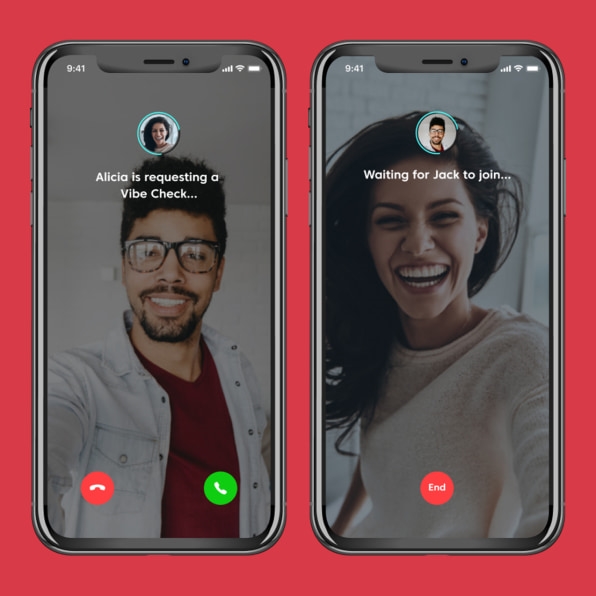
Other apps have leaned into full-on video dates. OkCupid is known as a playful brand that doesn’t shy away from asking questions to optimize its matching algorithm: even in a pre-COVID world, it asked users personal questions such as their preferred presidential candidates and their attitudes toward climate change, guns, and interracial marriages; and fun ones such as how many times they brush their teeth, if they’re into shower sex, and if they clap when a plane lands. When social distancing commenced, OkCupid started asking its users how they planned to date during the crisis, and about their ideal virtual dates.
“There’s been a 200% increase in people reporting that they’ve been on a virtual date this month compared to last month,” CEO Ariel Charytan tells Fast Company via email.
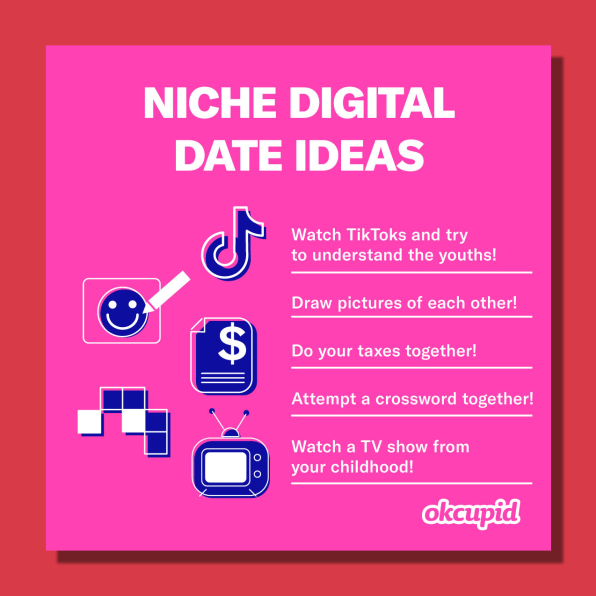
People have gotten creative with their dates, he says, and it’s their ideas—via 1 million responses to coronavirus questions—that have shaped OkCupid’s suggestions. Those “niche digital date” ideas include: building a playlist together; tackling a crossword together; watching an old concert on YouTube together; drawing pictures of each other; doing your taxes together; and “watching TikToks and trying to understand the youths.” Charytan mentions a pair in Denver who have been reading the same book in their spare time, then discussing it together on a video chat. And a man in Brooklyn who used alcohol delivery app Drizly to deliver bottles to him and his match for a wine-tasting date. “I love it,” says Toma, the professor, adding that playfulness is key for dating, whether digital or not. Now, these creative ideas are key to tackling stress and boredom.
These kinds of dates are also important for building emotional connections. A recent OkCupid user survey reported that 85% of the 70,000 daters who answered say it’s important to develop an emotional connection before a physical one. “The switch to virtual dates has allowed these emotional connections to thrive,” it concluded. It also reported a 5% increase in OkCupid users looking for long-term relationships and a 20% decrease in users looking for hookups.
Deeper connections matter more now than casual hookups
Toma agrees that people are now looking for emotional connections. But, because of a spike in activity on the apps, she fears that could mean an increase in the choice of people to talk to—which could make it more difficult to settle down with someone because there’s always something better around the corner, according to her research. “The more options you give people, the less satisfied they are with whoever they choose,” she says. “Having a lot of options creates a perception that the grass is always greener.”
Still, many of the apps, especially ones whose ethos leans toward long-term relationships, such as Match.com and Hinge, believe the situation will be beneficial to them and their users in finding emotional bonds. Hosseini, Match.com’s CEO, says the situation is conducive to getting to know someone, because you’re taking physical intimacy off the table. “I do think that people are looking for connection, and this may be a further shift away from hookup culture,” he says. McLeod, Hinge’s CEO, says this time period is for sowing the seeds for strong relationships, “versus the instant gratification by having more physical encounters, which you certainly can’t do right now.”
Tinder is the app that has a reputation for casual dating, with a core age demographic of 18 to 25, who tend to be far from thinking about marriage. The brand has continually doubled down on marketing campaigns focusing on pride in singlehood and not settling down. “Well, there’s not a lot of hookups going on, I hope!” Toma says, addressing the logistical impossibility during quarantine, but says phone sex is a popular alternative for some people; the OkCupid survey reports that 51% of its respondents enjoyed it.
Tinder registered its highest day of “swipes” in the history of the app on Sunday, March 29, with more than 3 billion swipes. Toma isn’t surprised by this trend, saying that single people, many of whom live alone, are experiencing isolation, anxiety, and boredom. They need an outlet, and engaging on apps could be key—even to simply finding friendship. “Social connection is really fundamental to the human condition,” she says. “It’s really essential for us to have it in a period of extended loneliness like this.”
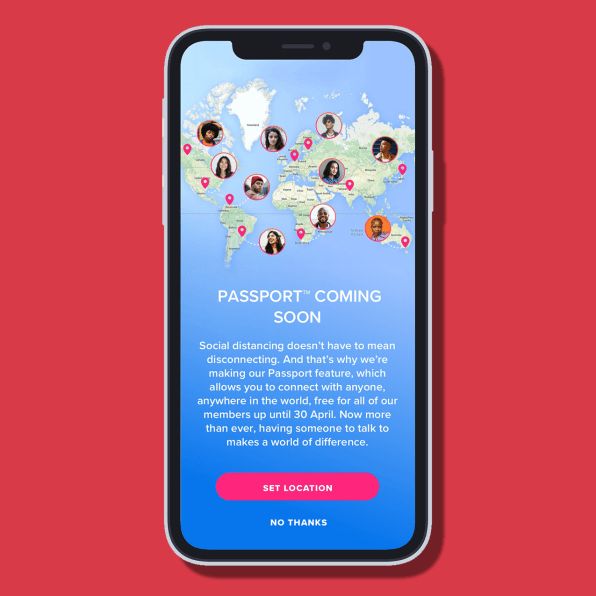
To address this, even hookup-friendly Tinder has also leaned into the idea of platonic friend-finding. It has temporarily taken the paywall down from its Passport feature, which lets you “unlock” your location and meet people in any part of the world. As the COVID crisis affects the entire world, Passport can connect people in New York, Seoul, and Rome, in an attempt to “fan these flames of social solidarity,” said Tinder’s CEO, Elie Seidman, in a message posted online.
“At this point, it doesn’t matter if I’m connecting with someone who’s five blocks from me or with someone 5,000 miles away from me,” a Tinder spokesperson told Fast Company. “I still want to talk to someone.” (What’s more, dealing with the crisis has become a conversation topic; Tinder reported a rise in the number of hand-washing emoji and toilet paper references in bios.)
Still, not all motivations for online dating are as straightforward or positive as wanting to find a partner or friend, says Toma, whose past research has shown various other reasons, which she believes will increase during the pandemic. People in relationships who are struggling in self-quarantine with a significant other may go on apps to reassure themselves that they have other romantic prospects. Some people struggling with boredom may actually be looking to cheat. And others may simply be seeking a shot of validation through notching up likes and matches for an ego boost to quell anxiety and vulnerability.
What this means for dating post-pandemic
Executives think the trends that we’re observing now may open up new, previously unexpected doors in the dating world, especially the use of video. Specifically, even post-pandemic, daters may want to use video chats as a way to vet suitors, as an “in-between step” between initial texting and an in-person date, to assess whether the person is worth the time, money, and energy for a meeting, and before giving out a phone number to a stranger. “It’s really a great investment to see if you have a spark with someone and you want to spend an hour or two hours with them or not,” Match.com’s Hosseini says.
That should also help overcome what Toma dubs the “idealization bubble” that she’s found is common in digital dating. Through text-only communication, it’s easy to build up an exaggeratedly optimistic version of the other person, overidealizing them to the point that they are often disappointing in real life, when we can finally observe their mannerisms and behavior in social settings. “It’s really easy to imagine that they are greater than they actually are,” she says. An initial video chat could be a good way to manage that—so that that idealization bubble “doesn’t burst” at the bar.
Of course, how the pandemic ends is anyone’s guess, and it’s likely that the “reopening” will be a phased approach. That may mean bars and restaurants stay closed for a while, and social distancing of some degree remains the norm for some time to come. Social events may be the last things to return, and so Hinge’s McLeod says dating services may become even more crucial, with video remaining a primary function in the long term. (Not to mention it’s a cheaper date during a recession.) “People will be craving human connection, but ultimately it’s what’s available to us practically,” he says.
Toma views the return to normalcy as a two-stage process. In the immediate term, especially if we’re released in the summer, people will crave being outdoors and having human contact—”replenishing our need for face-to-face connection.” Thereafter, people may return to dating apps and use the skills and techniques they learned during the lockdown to inform their long-term love lives, including those who weren’t using apps at all before the pandemic. People will continue to overcome their qualms with video, and find that it’s not as awkward as they’d thought—and that, minus the lack of proximity and nonverbal communication, it’s not all that different from early face-to-face dates.
Match.com’s Hosseini agrees: “I actually think we’ll look back on this period and find that folks were forming pretty strong connections.”
(41)

